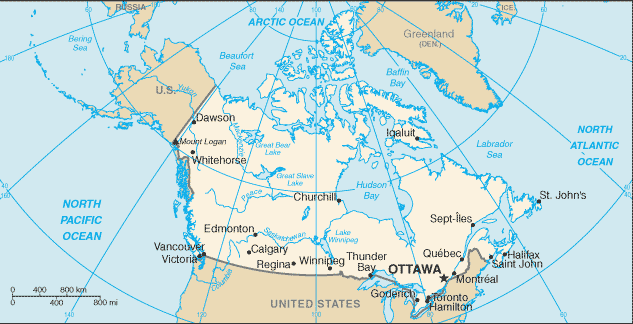 Amid the controversies over how Canada's federal government and provinces will divide regulatory oversight as well as the tax revenues from legal cannabis, a largely overlooked question is the role of the country's First Nations. With passage of the Canadian Cannabis Act now imminent, indigenous groups agree they want more involvement in the process. But First Nations are divided between those hoping for a windfall from legal sales and those actually calling for passage of the Cannabis Act to be put off because native peoples were not properly consulted.
Amid the controversies over how Canada's federal government and provinces will divide regulatory oversight as well as the tax revenues from legal cannabis, a largely overlooked question is the role of the country's First Nations. With passage of the Canadian Cannabis Act now imminent, indigenous groups agree they want more involvement in the process. But First Nations are divided between those hoping for a windfall from legal sales and those actually calling for passage of the Cannabis Act to be put off because native peoples were not properly consulted.
In the jurisdictional dilemmas over the shape of legal cannabis in Canada. a largely overlooked question is that of country's indigenous peoples, or First Nations. These are now split on whether to embrace or eschew legal cannabis in their reserves and unceded lands. However, all agree that First Nations should be involved in crafting the new policy, at both federal and provincial levels.
First Nations, along with the far-northern Inuit (popularly known to the outside world as "Eskimo") and Métis (peoples of the Prairies, of mixed indigenous and European ancestry), together number some 1.5 million, or about 4.3% of Canada's total population. Their registered lands, making up 2,267 reserves, represent 0.2% of Canada's total land area. First Nation jurisdiction is contested on a much larger area under indigenous land claims—unceded territories outside the registered reserves.
Sovereignty at issue
The chiefs of Canada's Assembly of First Nations convened on May 2 to craft a position on the impending legalization law in western Quebec's city of Gatineau. The resolution they issued there called on the federal government to amend its legalization legislation—before the Senate as Bill C-45—to bar provincial regulations from applying on reserves, according to the Canadian Broadcasting Corporation.
The resolution also called for First Nations to be included in the excise tax revenue sharing framework, which under the current version of the bill is split 75-25% between Canada's 10 provinces and three territories on one hand and the federal government on the other.
"The federal and provincial governments must recognize and respect First Nations sovereignty and jurisdiction over their reserves and traditional territories," the resolution stated.
Manny Jules, chief commissioner of the First Nations Tax Commission, was urging senators to amend Bill C-45, to give taxing authority to First Nations governments so they can impose their own levy on cannabis cultivated or sold on reserves, the CBC reported.
Quebec-Labrador First Nations appeal to Senate: stop Bill C-45
With final approval of the Canadian Cannabis Act possibly just days way, the Assembly of First Nations Quebec-Labrador (AFNQL) is now calling for the Senate to delay its implementation. "Despite the Trudeau government's multiple commitments to First Nations, Métis and Inuit, it is clearly indifferent to its obligations, particularly in the area of consultation," said AFNQL Chief Ghislain Picard in a press release last week. "With regard to the legalization of cannabis, this offloading leads us to call on the sensitivity of the members of the upper house to delay the implementation of the Act."
The AFNQL is specifically rejecting the agreement between Ottawa and the territorial and provincial governments on the sharing of revenues from cannabis sales and production. The organization charges that indigenous communities—which have long had particular problems with substance abuse—have been left out of the process.
"To our knowledge, no provision has been made by the federal government to ensure that First Nations participate actively in the equitable distribution of these revenues to counter the serious impact of legalizing cannabis on First Nations citizens and their communities," Picard said in an open letter to Prime Minister Justin Trudeau.
"Faced with the indifference of the Canadian Prime Minister and his government, we must turn to the members of the Senate who seem more sensitive to the challenges at our doorstep, including cannabis," the letter continued. "The burden on communities will be significantly increased in terms of public health, social services and public safety. Are we the only ones who see the wave coming and not being adequately equipped to deal with it? The federal government cannot transfer its responsibility to the provinces and territories without consulting First Nations beforehand."
Saskatchewan First Nations look to legalization
On the other hand, some First Nations in Saskatchewan are hoping that profits from the province's retail outlets will fund social programs in their communities—and are even looking to secure their own permits.
The Battlefords Agency Tribal Chiefs is working with a company called Green Tec Holdings to establish a cannabis dispensary in the Saskatchewan town of Nipawin. Battlefords Agency President Neil Sasakamoose told the CBC: "The proceeds from any of the profits we make in this industry are directed to housing, training and employment, economic development, education, anything that can help sustain some life for First Nations people on reserve and give benefits."
Synergy Five Investments is embarking on a similar deal with the Peter Ballantyne Cree Nation and members of the Athabasca First Nations. Synergy has won permit rights in the Saskatchewan towns of North Battleford, Warman and Yorkton.
Cross-post to Cannabis Now
Graphic: Perry-Castañeda Library Map Collection







Recent comments
4 weeks 1 day ago
4 weeks 1 day ago
7 weeks 2 days ago
8 weeks 1 day ago
12 weeks 2 days ago
16 weeks 14 hours ago
20 weeks 19 hours ago
20 weeks 6 days ago
30 weeks 6 days ago
34 weeks 6 days ago